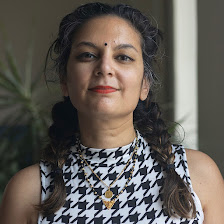

“Assimilate now, assimilate
once we break you, or assimilate when you die. The choice is up to you.”
In the vein of The
Handmaid’s Tale, in The Chai House, Priti Srivastava gives readers a
dystopian America where women are subjugated – for their own good, of
course. To protect women, the most
precious commodity, Knight and his authoritarian regime have taken over part of
a split nation and created rules that remove rights for females while giving
permission to men to be beasts. Women
can’t receive an education and have curfews. Knowledge is power, and they can’t
be out at night, you see, because it’s not safe…because of men. Oh, and if they
were out in the evenings, gallivanting about, they wouldn’t be in their homes
cooking dinner for their Knights and doing their chores. A Queen might have it
a little better with her arranged marriage and purity intact (prior to arranged
marriage, naturally), because those impure women, the worker wives (who do the
scullery), and the loaner wives (available because men need companionship when traveling,
bless their hearts), allow a Queen to have a modicum of freedom...from the men
and their rules.
While Srivastava doesn’t give
the specifics of what got the world to this point, it’s implied that the nation
split, and possibly chemical warfare ensued. There’s reference to the Mideastern
wastelands and fumes that cause hallucinations and sterility in men, making it
a perfect place to send those noncompliant men. There are also references of continuing
battles to win or win back cities and territories from Knights, who seem to be
primarily white.
“I was out of my head. Or
too into it. You know how that is.”
Our main character and
narrator, Swati, is a strong-willed and intelligent young Indian American woman
who sums up her world early on by saying she had a good life until the Fascists
came. Her relationship with her mother, Amma, is complicated, and according to
Swati, Amma “will never understand love. She only understands duty. She only
understands rules.” But as happens when children mature or are forced to grow
up early, Swati begins to understand her mother’s actions and realizes there is
more to Amma’s behaviors than meets the eye, and Amma’s warning of being
cautious of powerful white men is a piece of advice to take seriously.
“I came here for a better
life for my daughter and instead both my daughter, and my granddaughter will
have less freedom than I ever did.”
Running parallel to Swati’s
story is a second one that seems intrusive and out of place initially. Readers
get brief snippets into the nomadic life of Cindy and her young daughter, Jenny.
These characters are voiced with a syrupy Southern accent, and they seem to be
white females who are rebels trying to survive and on the run from Knight. The
author shows the tenderness between this mother and daughter, but then juxtaposes
that with the things they must do to survive. There are alarming scenes that
are powerful in their irony, as in how Cindy considers herself a good parent
and the concern of Jenny that Cindy’s kindness could get them killed.
While the two separate plots
seem incongruous, Srivastava moves each forward and eventually connects them in
a most surprising and horrific way, leaving readers with a jaw-dropping ending
that had this one exclaiming, “WAIT! WHAAAAATTTT?!”
The Chai House is a
novella-length story (127 pages) that I think could do with a developmental
edit to fill the considerable holes and gaps in the stories. Granted, in
listening to a story instead of reading one, it’s easy to miss a quick but
vital piece of information. However, there were fine details that seemed
significant in their mention but where never explained or connected anywhere
else. Srivastava provides rich descriptions of scenes and situations, but often
there’s a lack of providing the why behind them. The result is that after I
finished the book, I had quite a “but what was X about?” list in my notes.
ABOUT THE NARRATION: Deepti
Gupta is a great narration choice, and her voicing of the Indian character –
young and old, male and female -- perfectly complemented Srivastava’s text. Her
pacing is slow but even, and while her Southern accent was a bit over the top,
it left no doubt as to who was speaking in those sections. I listened at 1.25x
on Audible, which was a little faster than I’d like, but better than 1x.
(Audible really needs to align with other platforms that allow finer tuning of
speed.)
Overall, The Chai House is
an excellent debut, and I plan on reading the eBook to re-visit the story. The
author is a gifted storyteller and this world they have created clearly has
more stories to be told. I will absolutely will pick up the next book they
write.


|
| Click to see the full tour post with purchase links, author links, and schedule |

Thank you so much for taking the time to listen to & review my book Kristine. With so much gratitude, Priti Srivastava
ReplyDeleteYou are most welcome. It was truly a unique story -- what an ending.
DeleteI just finished reading The Chai House and was so impressed with it, especially how that ending works!
ReplyDeleteRight? That ending was unexpected and perfect, really.
Delete